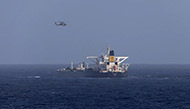Side Competition in Olympics: Island vs. Mainland
KAOHSIUNG, Taiwan - From six table tennis tables at the Olympic training center here comes the rhythmic clackclack- clack of ball against paddle against tabletop.
Outside, the tropical heat of southern Taiwan seems to wither even the palm trees, while inside, the players break into a sweat at the mere thought of this: trading serves with the team from mainland China in the Olympic Games next month.
“No matter how good China is, we hope to get a medal from the Olympics, a player named Chang Yen-shu said after watching his teammates practice one morning. “They’re hosting the competition and they know everything well. They’re the best players in the world. Until now, no one has been able to beat them.
Mr. Chang, 29, and the other four members of Taiwan’s table tennis delegation aim to upset mainland China at its national obsession. On the Olympic competition schedule, Mr. Chang’s team is not in the same part of the draw as China, so the Taiwanese have high hopes of facing their nemesis in the finals.
China has won 33 Olympic medals in table tennis, 16 of them gold; Taiwan has won only a silver and a bronze - both earned by Chen Jing, a woman who immigrated from the mainland.
A medal match between China and Taiwan would be one of the great underdog stories of the Games, not only because of the dominance of China in the sport, but also because of the unique relationship between the mainland and the island. The Chinese Communist Party regards Taiwan, a thriving democracy of 23 million, as a rebel province that must be brought back into the fold, by force if necessary.
Taiwanese athletes insist that the Olympics are about sports, not politics. Besides, relations between mainland China and Taiwan have been on the upswing after Ma Ying-Jeou, the conciliatory Taiwanese president, was inaugurated in May.
Yet the mainland and Taiwan have a long history of political rivalry over the Olympics , so Taiwan’s participation in the first Games on Chinese soil has the potential for volatility.
Taiwan’s contingent includes 76 athletes competing in 14 sports, with medal favorites in tae kwon do, archery and weight lifting. Olympic pride has been growing in Taiwan ever since two tae kwon do athletes, a man and a woman, each brought back a gold medal from the 2004 Games in Athens - the first gold for Taiwan. (The island’s athletes have won six silvers and seven bronzes.)
But some Taiwanese officials fear that Beijing could mar next month’s Games by trying to fuse sports and politics by identifying the Taiwanese delegation in ways that suggest that the island belongs to the mainland.
“We’re a bit concerned, said Tsai Ingwen, the chairwoman of the Democratic Progressive Party, which ruled this island for eight years until this May and has tried to distance Taiwan from the mainland. “What we fear is being treated like Hong Kong or Macao, which are part of China.
At the heart of the anxiety is a political disagreement over the Chinese words for the name of the Olympic delegation from Taiwan, known in English as Chinese Taipei.
The Chinese word for the first part of the name is Zhonghua. That comes from Zhonghua Minguo, or Republic of China, the name that the dominant political group here, the Kuomintang, prefers for Taiwan.
Mainland China signed an agreement with Taiwan in 1989 recognizing Zhonghua Taipei - Chinese Taipei - as the name for Taiwan’s delegation.
But sports officials on the mainland often call the Taiwanese delegation Zhongguo Taipei. Zhongguo, which means Middle Kingdom, is the Chinese name for China.
Referring to the Taiwanese delegation as Zhongguo Taipei implies that the athletes and the island they represent are part of China.
As early as last year, political tensions between China and Taiwan made their mark on the coming Games. The Taiwanese government led by Chen Shui-bian, then the president, who tried to move Taiwan closer to formal independence, decided in April 2007 not to allow the torch to pass through the island because the flame would then go on to Hong Kong, signifying that Taiwan was part of China.
That canceled an agreement Tsai Chenwei, president of the Chinese Taipei Olympic Committee, had signed in Beijing in December 2006 allowing the torch to come through Taiwan. Mr. Tsai said that he was disappointed with the decision.
“The torch hasn’t come here since the Summer Games were held in Tokyo in 1964, he said.
In recent years, Taiwanese athletes going to the mainland for various competitions have generally been welcomed, Mr. Tsai said.
Sung Yu-chi, 27, a first-time Olympian in tae kwon do, said, Sports and politics are separated.
“In China, because we’re the same ethnicity, it’s easier to compete there, he added.
But one of Mr. Sung’s tae kwon do teammates said she hoped to use the Olympics to announce the island’s presence to the world.
“We want to win gold medals so people in the world know about Taiwan, said the teammate, Yang Shu-chun, 22. “Taiwan is very close to China, but it’s just a small island. I worry people don’t know where Taiwan is. But if I win a gold medal, people will ask, ‘Where’s Taiwan?’ and try to get to know us.
스마터리빙
more [ 건강]
[ 건강]이제 혈관 건강도 챙기자!
[현대해운]우리 눈에 보이지 않기 때문에 혈관 건강을 챙기는 것은 결코 쉽지 않은데요. 여러분은 혈관 건강을 유지하기 위해 어떤 노력을 하시나요?
 [ 건강]
[ 건강]내 몸이 건강해지는 과일궁합
 [ 라이프]
[ 라이프]벌레야 물럿거라! 천연 해충제 만들기
 [ 건강]
[ 건강]혈압 낮추는데 좋은 식품
[현대해운]혈관 건강은 주로 노화가 진행되면서 지켜야 할 문제라고 인식되어 왔습니다. 최근 생활 패턴과 식생활의 변화로 혈관의 노화 진행이 빨라지고
사람·사람들
more
[인터뷰-문경환 한인회장] “캔자스, 이민자들에 제2의 기회의 땅”
“캔자스시티는 삶의 속도와 기회의 균형이 잘 맞는 도시입니다. 제2의 인생을 시작하기에 더없이 좋은 곳이죠.”29일 본보를 방문한 문경환(61…

일사회 창립 14주년 기념식 및 송년행사
전·현직 민주평통자문위원들의 모임인 일사회(회장 박철웅)는 지난 16일 용수산에서 창립 14주년 기념식 및 송년회를 개최했다. 이날 행사에는 …
LA평통 통일전략분과 상견례
LA 평통(회장 장병우) 통일전략분과(위원장 이정현)는 지난 27일 형제갈비에서 상견례 겸 간담회를 개최했다. 이날 모임에서는 위원 간 교류를…
새해 ‘사랑의 쌀’ 나눔 내달 10일 교협 강당
남가주기독교교회협의회(회장 김재율 목사·이하 교협)가 새해를 맞아 ‘새해 오찬기도회 및 사랑의 쌀 나눔’ 행사를 개최한다. 행사는 오는 1월1…
[송년 행사] 이승만 기념사업회
이승만 건국대통령 기념사업회(회장 박요한)가 지난 18일 시티 뱅큇 홀에서 송년회를 개최했다. 이날 행사에서는 장혜숙, 장준구, 이형숙, 이하…
많이 본 기사
- 트럼프 만나고온 젤렌스키 “우크라에 미군 주둔 방안 논의중”
- 이란, 트럼프-네타냐후 회담 직후 “당신들은 우리 못 꺾소”
- 소프트뱅크, 오픈AI에 410억달러 투자 완료…11% 지분 확보
- 새해 미국 건국 250주년… ‘트럼피즘’ 도전장 받은 민주공화정
- 디즈니 ‘유튜브에 아동정보 무단제공’ 1천만 달러 과징금 확정
- 단백질 늘리고 탄수화물 줄이고…영양소 적정 기준 개정
- 폭설 속 산행 비극… 마운트 볼디서 3명 조난 사망
- 한국팀 뛸 곳인데… 강력범죄 ‘충격’
- 가주 판매 간 소고기 ‘이콜라이’ 오염
- ‘아듀~ 2025!’… 희망찬 새해로
- 동포청 ‘재외동포 이해교육’ 실시
- [알림] 오늘 신년특집 발행
- [연말 화제] 올해도 찾아온 ‘얼굴 없는 천사’
- 인디브랜드가 이끈 K뷰티… 패션도 유럽 본고장 깃발
- “10년간 모든 이민 전면 금지?” 황당 주장
- 구리선 절도범 소행에 LA 교통 통신망 ‘먹통’
- 트럼프 “베네수엘라 마약 싣는 항만 타격”… 첫 지상 공격
- [경제 트렌드] AI 열풍 속에 신흥 2030 억만장자 급증
- 멕시코, 새해부터 韓포함 FTA미체결국에 관세…최대 50%
- 신년 연휴 폭풍우… 비 3인치 온다
- 한동훈 “가족이 尹부부 비판 글 올린… 2
- ‘백두산 호랑이’ 대가족 포착… “매우 희귀한 일”
- LA 북쪽 테혼 카지노서 하룻새 10만불 ‘연속 잭팟’
- [LA 일원 새해맞이 명소는] “웰컴 2026”… 남가주 새해맞이 행사 풍성
- ‘케네디’가 또 비극 외손녀 희귀암 별세
- [연말 기획] 한국계 혼혈들 두각… 각 분야에서 ‘맹활약’
- 캘리포니아 ‘억만장자세’ 추진에 빅테… 1
- 우크라 ‘푸틴 관저 공격설’에 종전 기대감 찬물
- ‘헤비급 복서’ 조슈아 구사일생 동승자 2명 사망사고에도 경상
- 목표는 1,000골… 불혹 호날두 “부상 없다면 가능”
- 트럼프 폭주에 흔들린 달러 패권…2017년 이후 최대 연간 하락폭
- “치매에 치즈가 좋대서 맨날 먹었는데”… 고지방 주의
- 이강인 뛰는 PSG, ‘2025 최고의 팀’
- ‘아뮈제 앙상블‘ 자선음악회 수익금 8000달러 전달
- SI “김하성 영입은 A-” 수비력 유지·공격력 향상
- 요키치 부상… 덴버, 마이애미에 덜미
- 케네디家 또 비극…케네디 외손녀 35세에 희귀암으로 별세
- [인터뷰-문경환 한인회장] “캔자스, 이민자들에 제2의 기회의 땅”
- [조지 F. 윌 칼럼] 저무는 2025년에 안도의 한숨
- 케이스쉴러 주택가격지수 상승
- 기아, 타임스퀘어 새해 전야 참여
- 안성기, 응급실 이송돼 중환자실 입원… “현재 치료 중”
- 쿠팡, ‘셀프조사’ 비판에도 미 증권위에 “3천건만 유출” 공시
- 트럼프 이름 덧붙인 ‘케네디센터’ 공연 줄취소
- [수요 에세이] 다시, 제자리로 돌아와서
- 연방정부, 기업 채용·승진정책 조사
- 샴페인, 마지막 날과 첫날을 위하여
- 원·달러 환율… 연평균 기준 ‘역대최고’ 마감
- [한인 은행장 신년사 통해 본 비전과 경영 목표] “끊임없는 변화와 혁신으로 안정적 성장 도모”
- [만화경] 경영자의 ‘문제적’ 사과
1/5지식톡

-
 미 육군 사관학교 West Poin…
0
미 육군 사관학교 West Poin…
0https://youtu.be/SxD8cEhNV6Q연락처:wpkapca@gmail.comJohn Choi: 714-716-6414West Point 합격증을 받으셨나요?미 육군사관학교 West Point 학부모 모…
-
 ☝️해외에서도 가능한 한국어 선생님…
0
☝️해외에서도 가능한 한국어 선생님…
0이 영상 하나면 충분합니다!♥️상담신청문의♥️☝️ 문의 폭주로 '선착순 상담'만 진행합니다.☎️ : 02-6213-9094✨카카오톡ID : @GOODEDU77 (@골뱅이 꼭 붙여주셔야합니다…
-
 테슬라 자동차 시트커버 장착
0
테슬라 자동차 시트커버 장착
0테슬라 시트커버, 사놓고 아직 못 씌우셨죠?장착이 생각보다 쉽지 않습니다.20년 경력 전문가에게 맡기세요 — 깔끔하고 딱 맞게 장착해드립니다!장착비용:앞좌석: $40뒷좌석: $60앞·뒷좌석 …
-
 식당용 부탄가스
0
식당용 부탄가스
0식당용 부탄가스 홀세일 합니다 로스앤젤레스 다운타운 픽업 가능 안녕 하세요?강아지 & 고양이 모든 애완동물 / 반려동물 식품 & 모든 애완동물/반려동물 관련 제품들 전문적으로 홀세일/취급하는 회사 입니다 100% …
-
 ACSL 국제 컴퓨터 과학 대회, …
0
ACSL 국제 컴퓨터 과학 대회, …
0웹사이트 : www.eduspot.co.kr 카카오톡 상담하기 : https://pf.kakao.com/_BEQWxb블로그 : https://blog.naver.com/eduspotmain안녕하세요, 에듀스팟입니다…
케이타운 1번가
오피니언
 정숙희 논설위원
정숙희 논설위원샴페인, 마지막 날과 첫날을 위하여
 조지 F·윌 워싱턴포스트 칼럼니스트
조지 F·윌 워싱턴포스트 칼럼니스트 [조지 F. 윌 칼럼] 저무는 2025년에 안도의 한숨
 김동찬 시민참여센터 대표
김동찬 시민참여센터 대표 [미국은 지금] 책임 있는 자본 없으면 커뮤니티 미래도 없다
 성영라 수필가 미주문협 부이사장
성영라 수필가 미주문협 부이사장 [수요 에세이] 다시, 제자리로 돌아와서
 신경립 / 서울경제 논설위원
신경립 / 서울경제 논설위원 [만화경] 경영자의 ‘문제적’ 사과
 문태기 OC지국장
문태기 OC지국장 한인 정치력 업그레이드 기대
 민경훈 논설위원
민경훈 논설위원세계 역사를 바꾼 동물
 박홍용 경제부 차장
박홍용 경제부 차장 한인사회가 주목해야 할 새해 경제
 박영실 시인·수필가
박영실 시인·수필가 [화요칼럼] 피드백
1/3지사별 뉴스

메트로카드, 31년만에 역사 속으로
1994년 처음 등장해 지난 31년간 뉴욕시 전철과 버스 승차권으로 쓰인 메트로카드가 31일을 끝으로 역사 속으로 사라진다. 더 이상 메트로카…
■ 사고- 한동대·뉴욕한인청소년센터 국제여름캠프

2025 워싱턴지역 10대 뉴스
다사다난했던 2025년이 하루만 남겨둔 채 역사의 저편으로 저물고 있다. 올해의 가장 큰 뉴스는 트럼프 2기 행정부 출범과 함께 몰아친 이민 …
내년 1월부터 달라지는 MD 법안들

셀폰 위치추적, 납치된 딸 살렸다… ‘부모 통제’ 기능 활용
스마트폰에서 자녀의 위치를 확인할 수 있는 ‘부모 통제(parent control)’ 위치 추적 기능의 도움으로 납치됐던 청소년들이 잇달아 구…
[새해부터 이렇게 달라진다] 최저임금 또 오르고… 유급 병가는 더 확대

오늘 하루 이 창 열지 않음 닫기 


















































.png)


댓글 안에 당신의 성숙함도 담아 주세요.
'오늘의 한마디'는 기사에 대하여 자신의 생각을 말하고 남의 생각을 들으며 서로 다양한 의견을 나누는 공간입니다. 그러나 간혹 불건전한 내용을 올리시는 분들이 계셔서 건전한 인터넷문화 정착을 위해 아래와 같은 운영원칙을 적용합니다.
자체 모니터링을 통해 아래에 해당하는 내용이 포함된 댓글이 발견되면 예고없이 삭제 조치를 하겠습니다.
불건전한 댓글을 올리거나, 이름에 비속어 및 상대방의 불쾌감을 주는 단어를 사용, 유명인 또는 특정 일반인을 사칭하는 경우 이용에 대한 차단 제재를 받을 수 있습니다. 차단될 경우, 일주일간 댓글을 달수 없게 됩니다.
명예훼손, 개인정보 유출, 욕설 등 법률에 위반되는 댓글은 관계 법령에 의거 민형사상 처벌을 받을 수 있으니 이용에 주의를 부탁드립니다.
Close
x